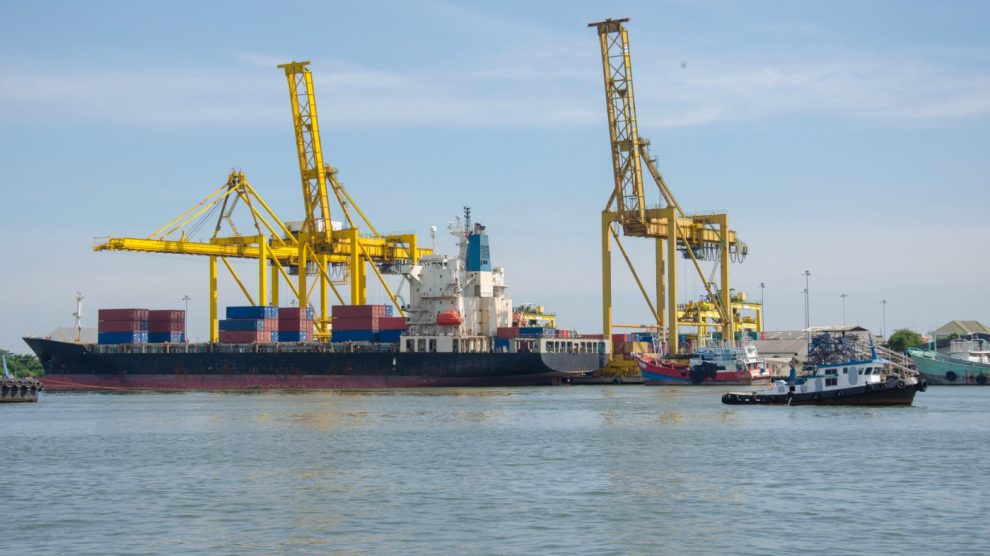Spy crane woes. As recounted by the Wall Street Journal, the Pentagon is increasingly concerned that Chinese-made ship-to-shore cranes might be hosting and operating spying equipment. Some United States officials have compared them to “Trojan horses” because of the sophisticated sensors they are equipped with to monitor container movements.
- Investigations are focussing on the cranes built and provided by Chinese State-owned ZPMC, owned by China Communications Construction Company, the contractor of several Belt and Road Initiative projects.
Data matters. The logistic data flowing through the cranes could theoretically allow China to map the seaports’ traffic. According to Drewry, a consulting firm, over 27% of global container trade would have passed through ports owned, at least in part, by Chinese and/or Hong Kong companies by 2021.
- Moreover, Beijing produces almost the entire global supply of maritime containers and a prominent shipping data collection service, dubbed Logink – which the Chinese government is encouraging ports, carriers and countries to adopt by providing it free of charge while also promoting logistics data standards that support the widespread use of the platform.
- Nevertheless, according to the US-China Economic and Security Review Commission, the platform “could create economic and strategic risks for the United States and other countries” by leveraging the Chinese government’s subsidies to undercut more innovative products at higher costs and enabling Beijing to “identify US supply chain vulnerabilities and to track shipments of US military cargo on commercial freight.”
- Also, the Chinese Communist Party “could potentially gain access to and control massive amounts of sensitive business and foreign government data through Logink”.
The Italian connection. ZPMC is a major player in Europe (through its subsidiary ZPMC Europe) as well as Italy (ZPMC Italia), where it has been operating since 2017 in Vado Ligure, a port city in Northern Italy. The company has 35 employees, and in 2020 it posted a nearly €4.9 million turnover, with more than one million in profits.
- ZPMC cranes are also present in multiple Italian ports. Recently, three more arrived in the Calabrian port of Gioia Tauro.
- As Elio Crovetto, director of ZPMC Italia, noted in 2019, the company’s market objectives “are not limited to the national territory but, in perspective, extended to the Mediterranean basin.”
- Thanks to a strategic partnership with the International Port Community Systems Association, Logink is used in the ports of La Spezia and Marina di Carrara.
China’s aims over Italian seaports. The People Republic of China’s reach within the country does not end with ZPMC, as more companies are engaged with, or even control, certain strategic locations. Parliament’s Intelligence Committee (COPASIR) has been monitoring – and warning against – Beijing’s aims on Italian strategic assets.
- In Vado Ligure, the seaport features a deep-sea container terminal, Vado Gateway. That’s managed by APM Terminals Vado Ligure Spa, an Italian company consisting of APM Terminals (50.1%), Cosco Shipping Ports (a subsidiary of State-owned Cosco) (40%) and Qingdao Port International (9.9%).
- As reported by Il Secolo XIX, Cosco is also interested in acquiring control over sections of the port of Genoa.
- Most recently, Progetto Internazionale 39 (a Sino-Italian company featuring Sergio Gao Shuai, a delegate of the Chinese government, as a shareholder) has been awarded a significant portion of the logistics platform of the port of Taranto, which, in turn, is a crucial junction for NATO activities.
- Another Chinese-controlled company, the Ferretti Group, just got approval to build a factory in the port area of Taranto that will produce hulls for yachts. The area is just ten miles from where NATO’s Standing Naval Forces and ships of the UN mission Irini are located.
- The Ferretti Group is also readying to buy the San Vitale shipyard in Marina di Ravenna from the Ravenna-based company Rosetti Marino.




